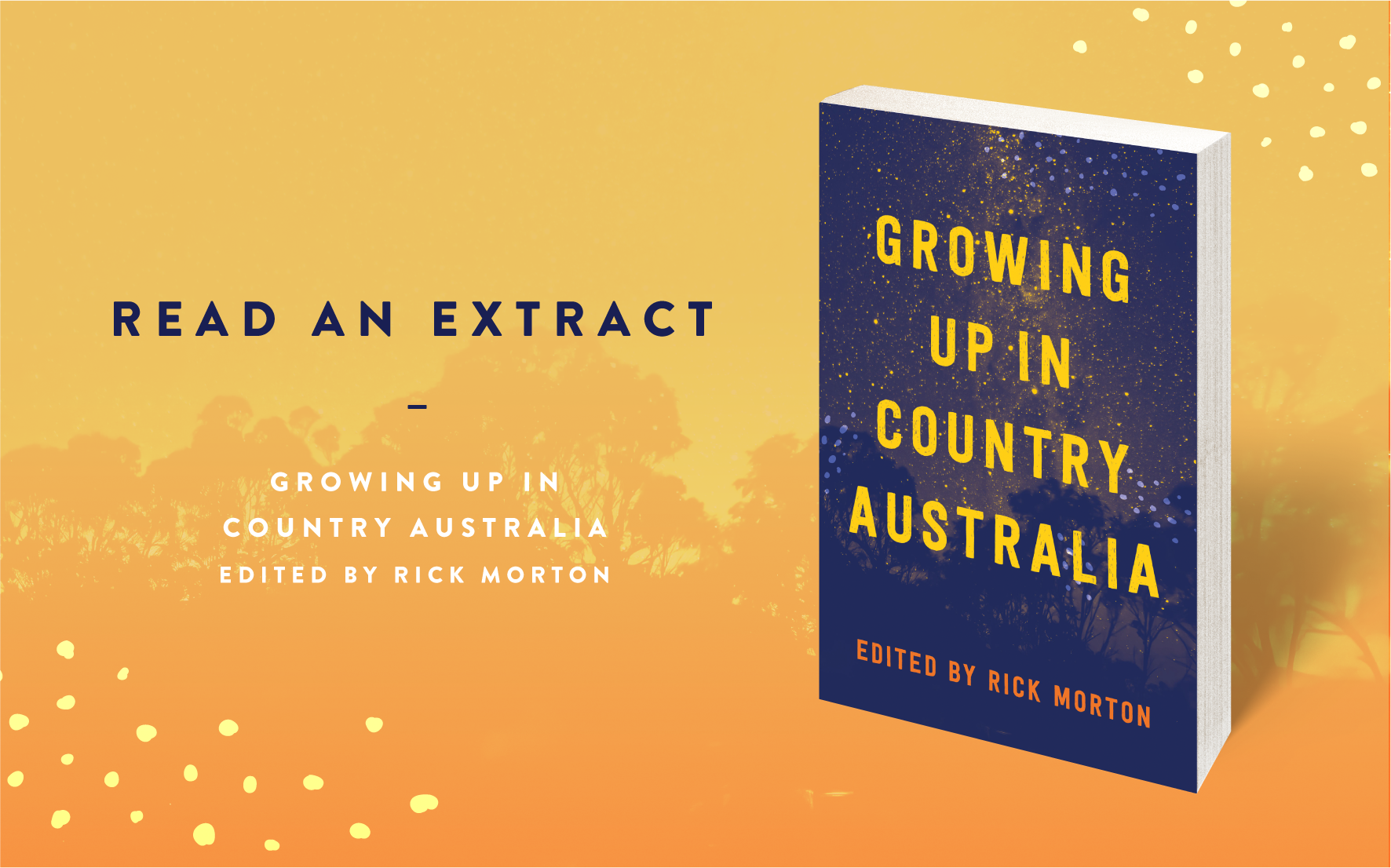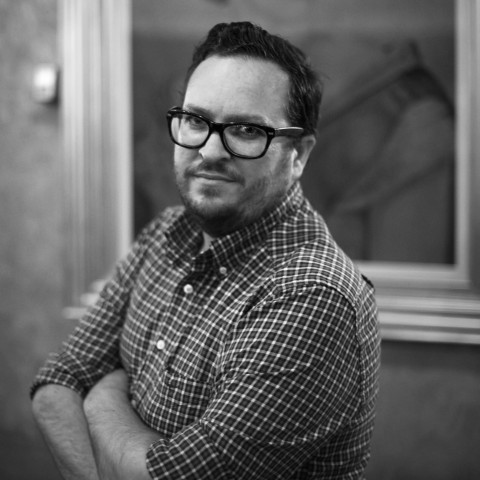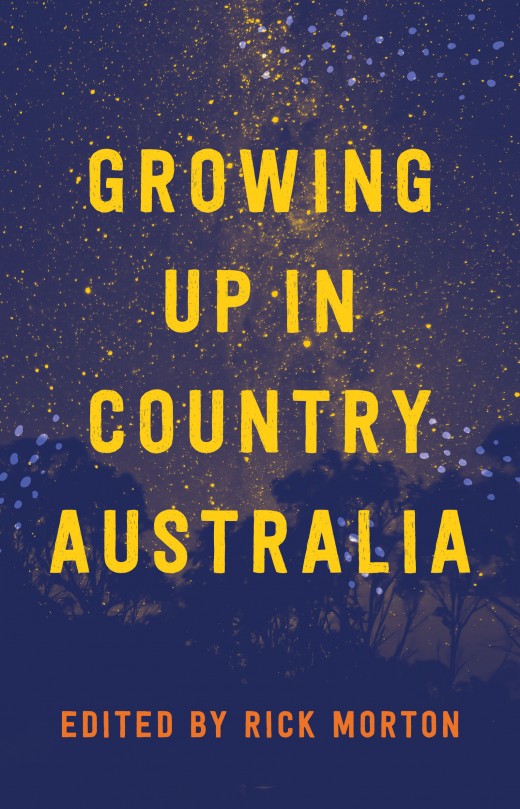News

News >
Summer of Reading: Growing Up in Country Australia
Part of our Summer of Reading series: Black Inc.’s bestselling Growing Up series goes to the country
Introduction
Rick Morton
In high school, I had one job.
A handful of friends and I spent three nights a week folding the local newspaper, the Fassifern Guardian, and two other publications that served surrounding districts in regional Queensland. It wasn’t especially glamourous. Some shifts we would work after class until almost midnight, black ink staining our hands and school uniforms. We folded rigs with the pages stacked into different levels and would pull newsprint from the top down, collecting everything at the bottom and creasing it with our soft little hands.
It was the best job, even at $6 an hour, and I never wanted to be anywhere else.
Still, I like to joke that I knew the threat of redundancies that haunted the legacy media years before I became a working journalist. The owners had long ago bought a machine worth tens of thousands of dollars. It was rumoured this contraption would replace us – if they could ever get it working. Every year, from the new millennium until I graduated in 2004, there were whispers that the Machine was close to ready. My friends and I felt like blue-collar workers from the ’80s, anxious and suspicious of the great automation that would soon be upon us.
On weekends, I also cleaned the Fassifern Guardian office and the workspace out back, which housed the Machine, the printing press and the compositor’s desk. I cherished this access; on deserted shifts I would take breaks in the archive, which was stacked with hardcopy newspapers, bound by year, going all the way back to 1901. In regional Queensland, where we still didn’t have machines to fold our family-owned newspapers (no, not that family), there was a degree of charm about the enterprise of searching through a town’s history.
It was always the same names: the Mullers, the Wimmers, the Nykvists, the Neuendorfs and what felt like a hundred other names of German origin. Some of the same stores too. In the main street of Boonah is Maynards, a clothing store from another era, which is still run by the titular family and still filled with product in boxes stacked on shelves stretching almost to the double-height ceiling. Ask Erroll for any size in any garment and he’ll eye off a dusty package in a distant quadrant and bring it back. He does this as if communicating with a part of himself hidden in every part of the store. If you visit more than once, you won’t even need to remind him of the size you’re after. Erroll remembers.
One of the big stories from the middle of the twentieth century was a local government election that was marred by the appearance of a ram at a polling booth. The big boofhead was being a menace and preventing the citizenry from casting their votes. I can’t remember how it all panned out, but there was a fuss and it now remains in print for all time.
Later in my young adult life, I returned as a journalist to the newspaper. One afternoon, when everyone else had gone home, an old gentleman from a neighbouring town walked into the office holding a pawpaw and coughed expectantly until I popped my head out from another room.
It was an especially large pawpaw. Mum had some pawpaw trees in her yard at the time, but I had never seen one like this.
‘It’s 4.3 kilograms,’ the man said.
And I said, ‘That’s great. A phenomenal achievement.’
And then he said: ‘Are you going to photograph it?’
So, I did. The story ran in the following week’s edition.
Now, there have been bigger moments in my career. Times where things changed. Stories that helped someone and stories that didn’t. There were assignments that were just plain fun and some that were so moving I wept. But as far as great days go, this one left me thrilled.
It seemed to me a perfect distillation of the country Australia bargain. Yes, everyone will know your business. Secrets are hard to keep. And when things go wrong it feels as if the strain is magnified. In return, however, there are 4.3-kilogram pawpaws, curiosities, artefacts; the full breadth of the natural world.
When I was just a boy, living on a remote cattle station five hours west of Charleville in Queensland’s channel country, this world was endlessly fascinating. In my mother, Deb, I had a guide who was herself curious and kind (except when it came to snakes).
Don Watson once wrote: ‘Deep in the Gippsland subconscious there lay coiled a snake.’ I thought this applied rather nicely to all of Australia, especially the regions, and it certainly governed a lot of our life. When we weren’t fretting about them, Mum was showing me the different kinds of birds – glorious wedge-tailed eagles, peregrine falcons, Major Mitchell’s cockatoo, brolgas, finches – and small mammals. My brother, Toby, and I made cubby houses in the scented mulga shrub that erupted with sensation after the rain, chased feral pigs into the dry creek beds filled with opal and lined by river red gums.
Sometimes I wonder who I would be if I didn’t see the world in such detail from such a young age. Perhaps flatter, in my dimensions. This early connection to the land is a shadow of what this continent’s First Peoples know to be an overwhelming imperative. To be and stay in communication with Country is not just a matter of culture but of personal health.
It is also a privilege.
My family and I saw the other stuff, too. The addiction and crime; the heartache of losing friends to accidents, which are more common in the bush; the small-mindedness and periodic rejection of minorities. Despite being able to see the horizon, we realised how suffocating our lives could be. How denuded of opportunity, or so we felt.
This collection of writing is, I hope, a way to be honest about all of it. Having spent half my life now living in cities, it is increasingly the country life that I crave. Others may have been formed in rural areas but will never return because of the scars left by those experiences.
Ask anyone what growing up means and they’ll assume it refers to an exit from childhood. That is not the definition we have taken here. At thirty-five, I am still growing up. People have encountered foundational moments at the age of forty, sixty and eighty. There have been times when children have been the most grown-up people in a room full of adults. There were hundreds of submissions to this collection and although it is impossible to include all of them, the themes were striking to me. Of loneliness or belonging, sustenance or degradation; or even the particular politics of the country school bus. Unlike public transport in the cities, these buses are a pre-programmed ride for the same kids on the same route every day. Whole fiefdoms are given the chance to develop in this closed system. I didn’t even get to use a school bus until I started Year 3 – when we moved to Boonah and I had to go to a ‘real’ school – and I had largely blocked out those forty-five-minute-each-way trips where the older kids would hoot and holler and I would try to look out the window and be small.
Nothing seemed to illustrate the far-reaching powers of the school, or its status as a panopticon in student lives, than when special assemblies were called to discuss what happened on the bus yesterday.
Much of what we see about life in the bush is coloured by the romance of days long behind us. I wanted this anthology to be a more modern account. One thing that has always fascinated me, as a white boy raised in an almost entirely white part of the world, was how migrants found life in the country. Especially when they skipped the big cities altogether and arrived from their homelands to settle in the regions. What does that do to the soul, to lose a common language and culture and in doing so find that the ability to remain in the background also vanishes? No one person’s account is the same as another’s, of course. You will find in these pages a colourful and gripping pastiche that updates the experience outside Australia’s cities and large regional centres. You will find, despite the absolute variety in these essays, that there is still something ineffable about life in the country.
Perhaps that is the one secret we get to keep.
Slow Life
***
Sami Shah
There was a moment, halfway through Melbourne’s extended lockdown of 2020, when I realised I had my four years in a country town to thank for my ability to cope with isolation. There was something familiar about the sudden lack of activity; spending long days with nothing to do but consider how long until the next meal, the next shower, the next time I could reasonably crawl back into bed. Instead of finding the sudden brakes applied to the hectic forward motion of life in Melbourne upsetting, or even traumatising, it felt comfortable. I knew how to do nothing. Northam had taught me that well.
It wasn’t always like this. I grew up in Karachi, a city of twenty-four million people, all of them vibrating with the need for the now – get to work now, pay the bills now, meet your friends and family now, party hard now, run for your life now. Sleep is a waste of time. While you sleep, everything can change. A friend can be shot and killed, a terrorist can blow himself up, a riot can bloom. Or, alternatively, a family member can get married, a new restaurant can open, friends can suddenly appear with rolled joints of hash, a trip to the beach can eventuate. Karachi is a city that thrums with restless, even manic, energy and if you don’t sync to that frequency you will be left behind. And being left behind means you’ll always be catching up. You work from nine a.m. to nine p.m., then spend your earnings in the hours between. Until I was thirty-five, I knew no other way of living, and if you’d asked me – shouting your question over the din of life – I’d say there was no other way worth living.
Then, I ended up in Northam, Western Australia, with a population of 4000. I’d been to weddings with more people in attendance. It wasn’t the plan of course. The plan was to leave one big, mad city and move to another big, mad city: Karachi to Melbourne, keep the momentum in place, ride the adrenaline from kebab rolls at two a.m. on Tariq Road to Laksa at three a.m. on Russell Street. Except the immigration department had another plan, which superseded any plans I might have bothered aspiring towards. Melbourne would have to be earned, a gift given only after my family and I had spent four years in a country town in WA. Instead of revelling in the hyper-existence of urban twenty-first century, I was sentenced to 1950s pastoral. Rural Western Australia is what happens if quaint British towns take a nap and never wake up.
Once, years after I’d finally escaped to Melbourne, comedian Rhys Nicholson was touring through WA. Having finished his show in Northam, he called me and asked where he could find some dinner. It was just past nine at night, and I answered, ‘The servo should be open.’ Rhys laughed, called me a sarcastic prick, and went off looking for grub. An hour later he called to apologise. Dinner had been crisps and a Diet Coke from the servo, because nothing else was open. That was my first big surprise after settling into our rental in Northam; everything closes early, and there isn’t much of anything in the first place. There was a single Chinese restaurant, two pubs and the aforementioned servo. And frankly, the food in the servo might be a bit better than what the others had to offer. I was used to eating whatever I wanted, whenever I desired it, and realising that this debauched Roman emperor lifestyle was no longer accessible was deeply upsetting.
Another adjustment: the silence. Karachi is cacophonous: millions of trucks and millions of buses and millions upon millions of motorcycles without silencers on their exhausts, roaring and raging at millions of cars, and donkey carts, and cursing pedestrians. There is a dull roar even before you reach the city, rising like a migraine the closer you get. I was so accustomed to it all, it didn’t register for me, as unnoticed as the heat of summer, or the ever-present threat of violence. Then, in Northam, I learnt how deafening silence can truly be. Standing on my porch on a clear night, I could hear nothing. No traffic, no angry shouts, no distant gunfire. The silence, in those first days, was a reminder of being isolated from all I knew, of having left behind all I loved. ‘You’re not in Kansas anymore.’ At least Oz still had singing and dancing lions and tin men. Northam was the kind of quiet that forced philosophical considerations of the insignificance of trees falling in abandoned forests.
In the first months I struggled with the stillness of my new surroundings. I raged against the injustice of having ended up in a place so bucolic, cursed the fates for having forced me to slow my life until it was barely moving at all. Then, slowly – of course, slowly, because there was no other speed setting – I learnt to adjust. I learnt that not everything has to be done right away. That having no place to go can mean learning to appreciate the place you’re in. And that I was able to find peace not in productivity but in peacefulness itself. I learnt to cook the foods I craved, spent afternoons walking through fields of canola and wheat, watched sunsets on the back of a ute with a six-pack of beers between myself and a friend. I learnt that hungering for the next wasn’t necessary, when the next would be the same as the now. The sameness of each day stopped being a frustration, and instead became something to savour.
Einstein explained the relativistic effects of time using a minute for a hand on a hot stove contrasted against an hour spent with a pretty girl. The former feels like an hour, the latter a minute. He could have used Northam and Melbourne for the same illustration. Four years in Northam felt like forty years, in the same way that four years in Melbourne now feels like just forty days. Except when the lockdown came. The propulsive force of Melbourne ground to a halt, and work-filled days and comedy club nights suddenly evaporated. A city of four million people were relegated to contemplating their own existence. It was like sending us all to a silent yoga retreat to find ourselves, and once we’d done that, we discovered we were stuck with ourselves for several months more. Friends grew suicidal, others learnt to cry. Marriages collapsed, relationships soured, and we were given a lesson in the fragility of the world we’d worked so diligent and tirelessly to construct. We’d convinced ourselves that always having things to do, places to go and people to see was good for us. And for many, the lockdown was evidence of the truth of that lifestyle. For me, however, it was a reminder to slow down before I fall, to sit in silence so I can hear myself think. The silence of empty Melbourne streets and endless Melbourne days felt like being back in Northam just for a little while again. And to my surprise, I savoured that reminder.
Share this post
About the author
Rick Morton is a senior reporter for The Saturday Paper, a regular guest on ABC’s The Drum and an award-winning author of three non-fiction books: 100 Years of Dirt, On Money and My Year of Living Vulnerably.
More about Rick Morton




